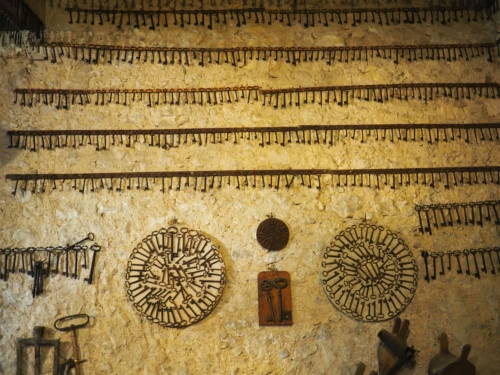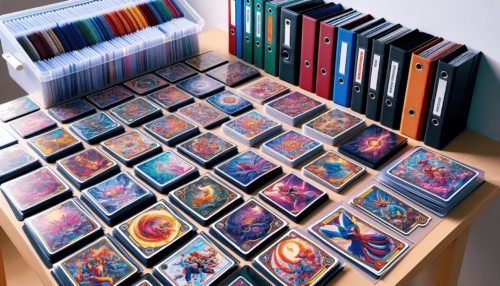Trading Card Game Collection: Have you ever found yourself staring at a mountain of trading cards, unsure how to turn that chaotic pile into a meticulously organized collection? As the world of trading card games (TCGs) grows and evolves, so does the complexity of managing a personal collection. This guide delves into advanced strategies that’ll help collectors not just sort their cards, but optimize their collection’s value and utility.

Table of Contents
Understanding the Value of a Well-Managed Collection
In the trading card universe, organization is more than just neatness; it’s a cornerstone of maximizing the enjoyment and financial value of a collection. A well-structured collection allows players and collectors to efficiently build decks, trade or sell cards, and even curate a personal gallery of treasured finds. Without a strategic approach to collection management, opportunities can be missed, and potential profits can be unrealized.
Historical Perspective on Trading Card Games
When examining the DNA of trading card games, it’s crucial to understand their roots. Initially, card games were simple and focused on entertainment. With the advent of games like Magic: The Gathering and Pokémon, there was a seismic shift in focus towards strategy, collectibility, and tradeability. This evolution ushered in the concept of cards as both game pieces and collectible items with potential future value.
The Emergence of Trading Card Collectibility
It wasn’t just gameplay that drew players in, but the thrill of opening booster packs, discovering rare cards, and engaging in trade negotiations. The early 1990s saw trading card games morphing into a cultural phenomenon, establishing a marketplace centered around rarity, card condition, and demand.

Essential Elements of Advanced Collection Management
Advanced collection management combines both art and science. It involves understanding market trends, assessing card conditions, and strategic trading.
Market Trends and Card Demand
Keeping abreast of market trends is pivotal. This means understanding which cards are in demand due to tournament play, nostalgia, or sudden spikes in popularity from new storylines or expansions. Tools like online price guides and collectible forums can offer insights into fluctuating values.
Card Condition and Preservation
Equally important is card condition, which affects value significantly. Proper preservation techniques, including the use of card sleeves, boxes, and humidity controls, ensure that cards retain their condition and market value. Collectors should become adept at identifying and minimizing potential damage such as edge wear and surface scratches.
Strategic Trading
Trade smartly and judiciously. Trading isn’t just about acquiring desirable cards; it’s an opportunity to offload extras and acquire duplicates that may increase in value over time. This involves understanding the foundational principles of win-win negotiations and valuing cards based not just on immediate worth but long-term potential.
Cataloging and Inventory Systems
Cataloging forms the backbone of any advanced card management strategy. It transforms a cumbersome task into a systematic process, making it easier to find, value, and trade cards.
Digital vs. Physical Organization
Choose between digital or physical cataloging. Digital platforms offer robust tools for tracking card details, market values, and trade history. Physical methods, such as binders and labels, provide tactile benefits and quick access.
Recommended Tools and Software
There are several tools available to assist in managing a TCG collection. Tools like Deckbox and TCGplayer offer comprehensive systems to log and track collections. Such tools provide up-to-date pricing and even allow users to establish trade wants and haves, simplifying peer-to-peer negotiation.

Table of Comparative Cataloging Tools
| Tool | Features | Pros | Cons |
|---|---|---|---|
| Deckbox | Online catalog, trade matching | Easy interface, social features | Limited offline capabilities |
| TCGplayer | Price tracking, marketplace integration | Accurate pricing, marketplace access | Subscription cost for premium features |
| Excel/Sheets | Customizable spreadsheets | Free, highly adaptable | Manual updates required |
Card Appraisal and Grading
Grading cards can greatly impact their marketability and value. While casual players may overlook this aspect, high-end collectors recognize the importance of professional grading services.
Appraisal Basics
Appraisal involves evaluating a card’s condition, rarity, and market value. This process can highlight key details such as centering, edges, corners, and surface conditions, which contribute to the overall grade of the card. A higher grade often translates to a significant increase in monetary value.
Grading Services
Professional grading services like PSA or Beckett assess cards according to strict criteria. This impartial third-party assessment can enhance the card’s value, often exponentially. Collectors should familiarize themselves with the grading scales used and understand the costs versus benefits of submitting cards for grading.

Building a Viable Trading Network
A robust trading network is invaluable for collectors looking to complete sets or acquire high-value cards.
Community Engagement
Engaging with local and online communities can provide access to a wider variety of cards and trading opportunities. Attend local card shops’ events or participate in online forums and social media groups dedicated to trading card games.
Trade Negotiation Skills
Successful trading hinges on effective negotiation. This requires clear communication, assessing mutual desires, and the ability to propose creative trade options. Maintaining a reputation for fairness is also crucial, as trust forms the foundation of any long-term trading relationship.
Minimizing Collection Risks
Collection management also involves risk assessment and mitigation, as collecting involves financial, emotional, and logistical investments.
Market Risks
Market risks pertain to fluctuating card values. Navigating these requires constant monitoring of market trends and cautious speculation. Diversifying card investments can protect against severe value drops.
Physical Risks
Physical risks include potential damage from environmental factors. Collectors should consider insurance for high-value collections and invest in adequate storage solutions to minimize damage from factors like sunlight, moisture, and dust.

Leveraging Online Platforms and Auction Sites
The Internet has drastically altered how collections are managed and valued.
Selling and Buying Online
Platforms like eBay and specialized trading card marketplaces streamline the buying and selling process. Understanding each platform’s specific tools, fee structures, and seller protections are crucial for maximizing profitability and minimizing disputes.
Online Auctions and Bidding Strategies
Online auctions can be competitive. Effective bidding strategies include setting a clear maximum price, bidding in the last moments to avoid bidding wars, and monitoring auction trends to time purchases for maximum value.
Conclusion: Strategic Collection Management as an Art Form
By implementing these advanced strategies, collectors can not only harness the full potential of their trading card collections but transform the process into a rewarding and potentially lucrative pursuit. These tactics emphasize the importance of informed decision-making, strategic organization, and proactive market engagement. For those willing to navigate the intricate world of trading card games, the rewards go beyond mere collection; they include community involvement, financial gain, and, ultimately, the art of curation.
Readers are encouraged to reflect on these strategies and share their own experiences and challenges in trading card collection management, fostering a shared knowledge base among enthusiasts. With dedication and strategy, anyone can elevate their collection to new heights.

